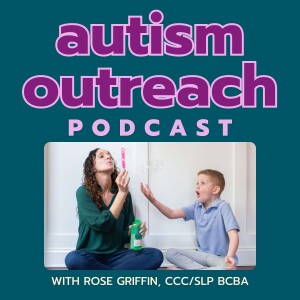
Autism Outreach - Easy Strategies For Parents and Professionals
Kids & Family:Parenting

#071: School Based IEP Development For Autistic Learners
 2022-05-10
2022-05-10
In my 20 years of experience, I have divided my time between school-based and private setting therapy. I have dedicated my career to autistic learners and today I want to share my TOP TEN tips on developing an IEP and conducting a successful smooth IEP meeting. These tips will ensure you are prepared, remain calm, and work to the benefit of the student, especially when working on more difficult cases for students who are non-typical or non-speaking.
- Record Review - The last comprehensive evaluation is very important. Has your student had an evaluation from an outside provider? What has the student previously worked on? Do they have prior IEPs and what do they look like?
- New Evaluations - What is the right evaluation for the student? My personal favorite is the VB-MAPP, I love the way it looks at language and communication. I also recommend the Functional Communication Profile - Revised, and the Assessment of Functional Living Skills is great for older students. Additionally, there are Speech Therapy Tests such as the Receptive One-Word Picture Vocabulary Test, The Expressive One-Word Picture Vocabulary Test, and the Clinical Evaluation of Language Fundamentals.
- Communicate with ALL Members of the Team - This includes teachers, parents, school-based providers, and any outside providers.
- Questions for Developing Goals - Do the targets take the learner's chronological age into account? Are the goals informed by typical development? Are these goals ambitious enough? How will achieving these goals improve the learner's quality of life? Are major barriers to progress considered? Are safety risks addressed?
- Shared Goals - The speech therapist collaborates with the teacher on speech goals. The goal is developed together and practice is embedded throughout the learner's day. For example, A Cooperative Leisure goal worked on across both spaces, in therapy, and in the general classroom.
- Specific, Measurable, and Consistent Goals - Ask yourself if the goals are specific? Are they measurable? And if another teacher, parent, or professional read them, would they make sense? Foundational Skills are important for younger, nonspeaking learners. These can include joint attention, imitation, requesting, and matching. For older students, ask can goals be tied to leisure and vocation.
- Data Collection - Consider how you're going to take data while you're writing the goals.
- Baseline Data - For autistic learners especially, be sure to include baseline data in the present section of the IEP. Baseline data is crucial to inform goals and to show progress.
- Send a Draft Home - Get Feedback! Some parents may have lawyers, advocates, outside providers, etc. It is important to make sure all members of the team are aware of the IEP goals and incorporate and embed the feedback that you can.
- Hold the Meeting, Work with the Team, and Create an Amazing Plan for your Students!
#austism #speechtherapy
What’s Inside:
- Top 10 Tips for a successful IEP Process.
- Helpful tips and strategies to use today.
- All about school-based IEP development for autistic learners.
- Working on an IEP with a large team.
- How to handle non-typical or difficult situations in an IEP meeting.
Mentioned In This Episode:
ABA Speech: Home
Start Communicating Today Live
More Episodes
 2024-08-06
2024-08-06
 2024-07-16
2024-07-16
 2024-07-02
2024-07-02
Create your
podcast in
minutes
- Full-featured podcast site
- Unlimited storage and bandwidth
- Comprehensive podcast stats
- Distribute to Apple Podcasts, Spotify, and more
- Make money with your podcast
It is Free
- Privacy Policy
- Cookie Policy
- Terms of Use
- Consent Preferences
- Copyright © 2015-2024 Podbean.com




